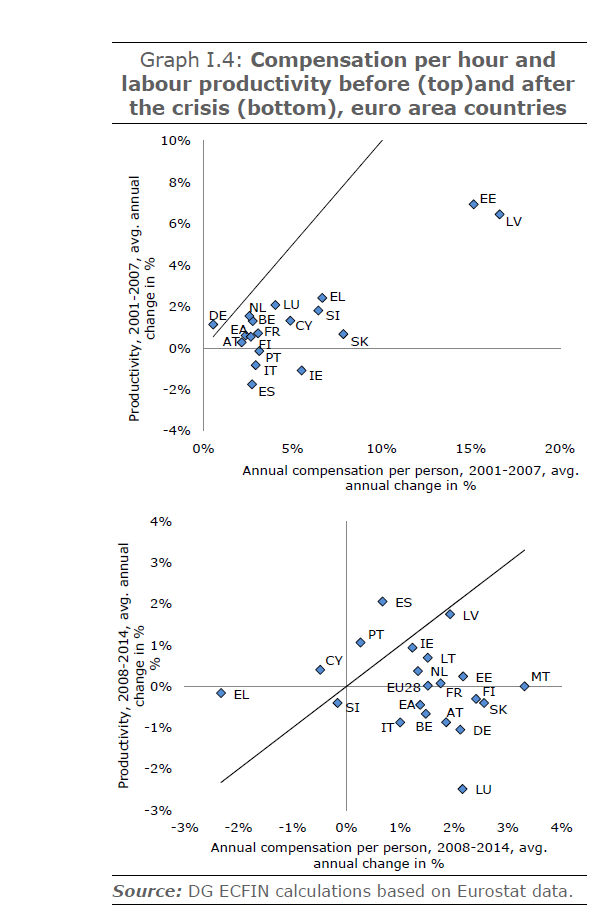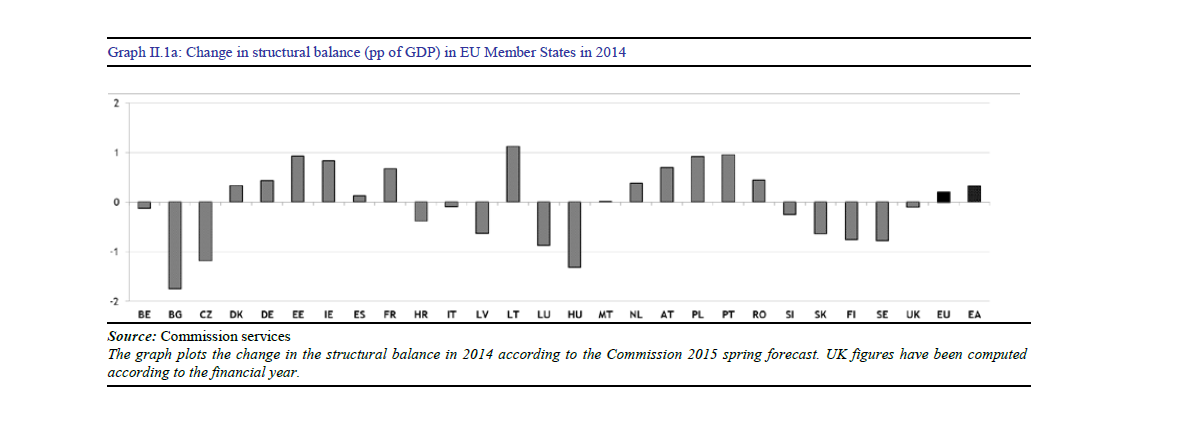We are currently witnessing a momentous time for the euro area. As the recovery seemed to be consolidating, the Greek crisis showed that the architecture of the Economic and Monetary Union (EMU) is still a fragile construction. It is true that significant progress has been achieved both at the national and supranational level in improving the functioning of the euro area since 2007. However, the euro project has not been completed. The large differences in both economic growth rates …Read More
The 2015 Stability and Convergence Programmes-An overview
After a sizeable reduction in government structural deficits in the past years, structural consolidation efforts continued in 2014, albeit at a slower pace. Compared to the 0.7% average consolidation effort that both the EU and the euro area implemented in 2013, the structural balance improved by 0.2% of GDP on average in the EU and 0.3% of GDP in the euro area in 2014. The implemented change in the structural balance was broadly …Read More
Optimal capital requirements over the business and financial cycles
Malherbe, Frederic, (2015), “Optimal capital requirements over the business and financial cycles”, ECB Working Paper Series, No 1830-July 2015, 14 July I study economies where banks do not fully internalize the social costs of default, which distorts their lending decisions. In all these economies, a common general equilibrium effect leads to aggregate over-investment. As a result, under laissez-faire, crises are too frequent and too costly from a social point of view. In …Read More
The new European Union
Wyplosz, Charles, (2015), “The new European Union“, Voxeu, 14 July The new bailout deal for Greece was not easy. This column argues that it was also a failure. It will not be enough to recapitalise banks, it asks for structural reform that exceeds Greek capacities, and it raises the Greek debt-to-GDP ratio to unsustainable levels. In a few months or quarters, the programme will fail and the Grexit question will …Read More
Completing Europe’s Economic and Monetary Union
Claude Juncker, Jean, Tusk, Donald, Dijsselbloem, Jeroen, Draghi, Mario, Schulz, Martin, (2015), “Completing Europe’s Economic and Monetary Union”, European Commission publications, 14 July The euro is a successful and stable currency. It is shared by 19 EU Member States and more than 330 million citizens. It has provided its members with price stability and shielded them against external instability. Despite the recent crisis, it remains the second most important currency in the world, with a share of almost a quarter of global foreign exchange …Read More
Saving Greece, Saving Europe
Eichengreen, Barry, (2015), “Saving Greece, Saving Europe”, Project Syndicate, 13 July Whatever one thinks about the tactics of Greek Prime Minister Alexis Tsipras’s government in negotiations with the country’s creditors, the Greek people deserve better than what they are being offered. Germany wants Greece to choose between economic collapse and leaving the eurozone. Both options would mean economic disaster; the first, if not both, would be politically disastrous as well. …Read More
Upgrading or polarisation? Long-term and global shifts in the employment structure: European Jobs Monitor 2015
Over the three-year period 2011 Q2–2014 Q2, employment growth in the EU was asymmetrically polarised, with the greatest growth in well‑paid jobs, some modest growth in the lowest‑paid jobs and declining employment in jobs in the middle of the wage distribution. There is a variety of patterns of employment shifts at Member State level, with most countries exhibiting either upgrading or polarising shifts, but with a significant minority also downgrading …Read More
France, Germany and the New Framework for EMU Governance
Maris, Georgios, Sklias, Pantelis, (2015), “France, Germany and the New Framework for EMU Governance”, Journal of Contemporary European Studies, Vol.23, Issue 2, 13 July The European crisis is the best case study for examining both the vulnerabilities of Europe’s framework for economic governance and the very process of European integration itself. This statement is true for several reasons: first, because the European crisis is the most serious crisis the European …Read More
Slower Growth in Emerging Markets, a Gradual Pickup in Advanced Economies
Global growth is projected at 3.3 percent in 2015, marginally lower than in 2014, with a gradual pickup in advanced economies and a slowdown in emerging market and developing economies. In 2016, growth is expected to strengthen to 3.8 percent.A setback to activity in the first quarter of 2015, mostly in North America, has resulted in a small downward revision to global growth for 2015 relative to the April 2015 World Economic Outlook …Read More
The non-independent ECB
Wren Lewis, Simon, (2015), “The non-independent ECB”, Mainly Macro, 10 July Imagine that the Scottish National Party (SNP) had won the independence referendum. The SNP starts negotiating with the remaining UK (rUK) government over issues like how to split up national debt. On some issue the negotiations get bogged down. Rumours start circulating that this might mean that rUK will not form a monetary union with Scotland, and that Scotland …Read More








